333rd Session of the Senate
Highlights
- The Senate met for 23 hours and 59 minutes in 12 Sittings during 333rd Session
- Average time per sitting recorded at 2 hours
- Longest sitting of 333rd session held for 4 hours and 07 minutes: shortest sitting lasted for only 08 minutes
- No bill passed during the 333rd Senate Session
- 25 private members bills were introduced during 333rd Session
- The Senate passed four (4) Resolutions
Working Hours
The 333rd session of the Senate began on November 02 and was prorogued on November 27, 2023. During the session spanning 26 days, 12 sittings were convened. The schedule of the sittings during the session is given in Appendix A.
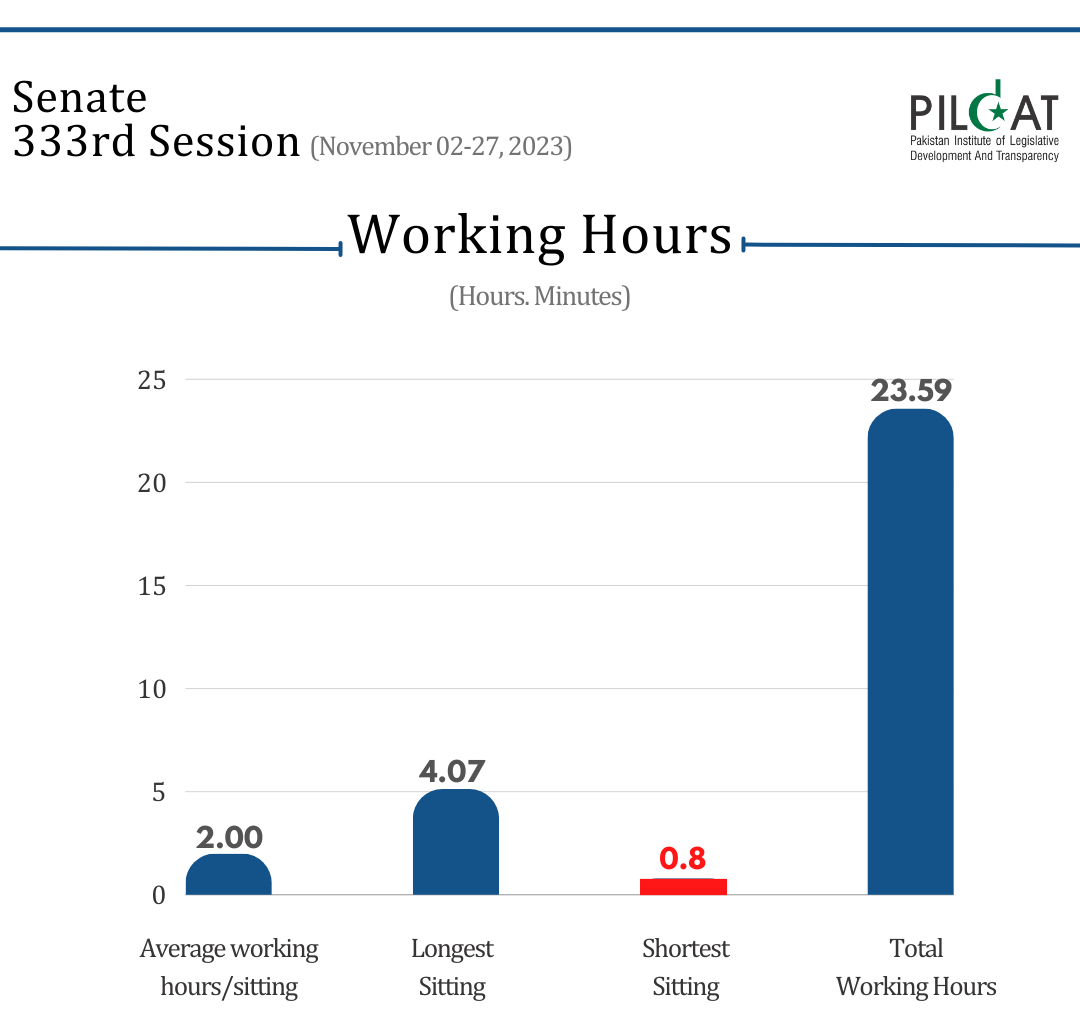
The 333rd Sessions of the Senate was convened for 23 hours 59 minutes with an average time of 2 hours per sitting. The longest sitting of the session was held on Monday, November 13, when the house was adjourned after meeting 4 hours and 07 minutes. The shortest sitting was held on Friday, November 17 when the House was adjourned after meeting for only 08 minutes.
The average delay in starting a sitting was 6 minutes during the session.
Agenda Items Left Over
27.70 agenda items were left over during the 333rd Session of the Senate.
Quorum
Quorum was pointed out twice during the session on November 03, and November 14, 2023. On both occasions, sittings were adjourned due to the lack of quorum.
Attendance
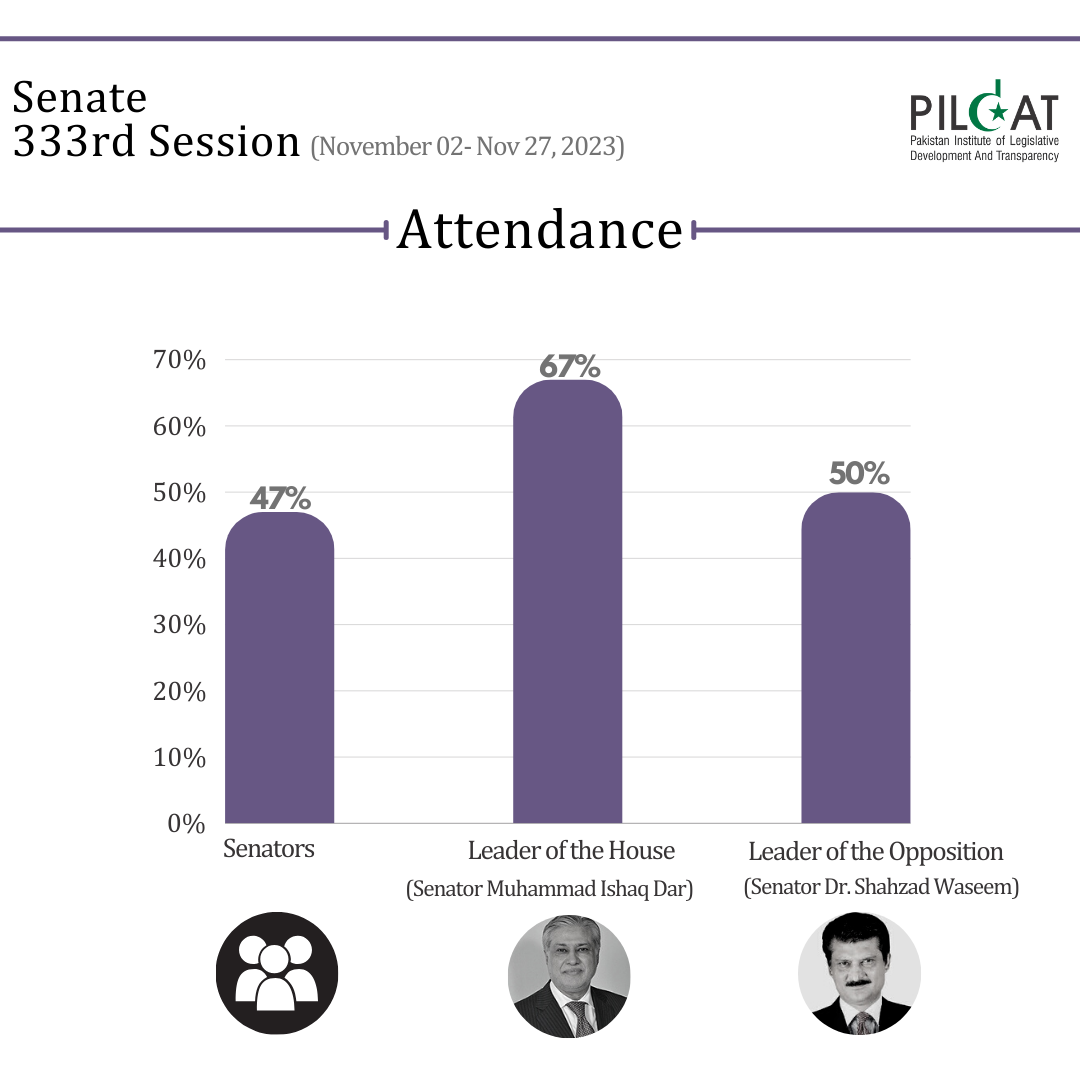
Senator Mohammad Ishaq Dar, Leader of the House (Punjab, PML-N) attended 8 or 67% sittings of the 333rd session. He was followed by Senator Dr. Shahzad Waseem, Leader of the Opposition in the Senate (Punjab, PTI) who attended 6 or 50% sittings. On average, 47 Senators were recorded as present during the 333rd session.
Top 5 Vocal Senators
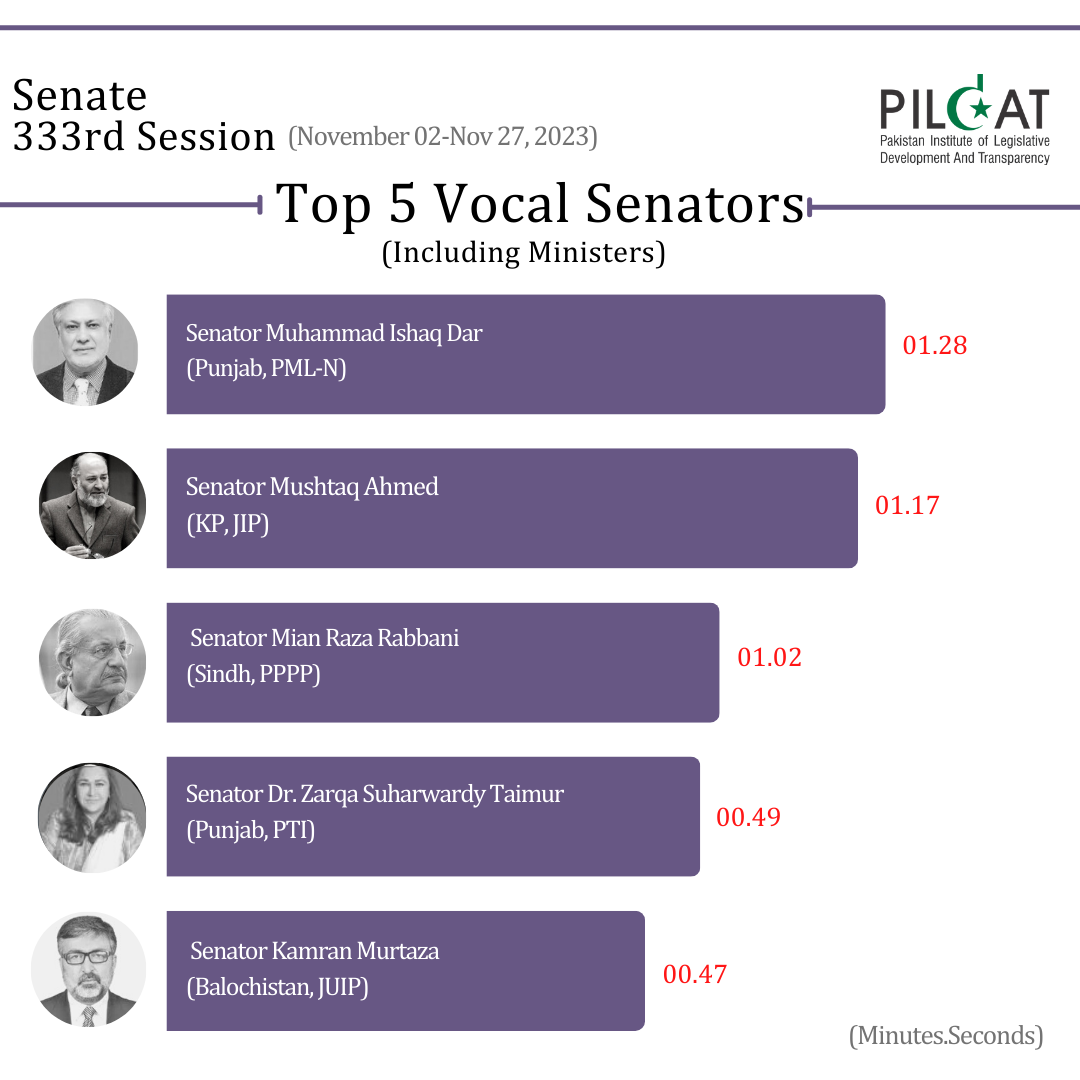
Senator Muhammad Ishaq Dar (Punjab, PML-N) was the most vocal Senator during the 333rd session with a recorded talk time of for 1 hour and 28 minutes. He was followed by Senator Mushtaq Ahmed (KP, JIP) who spoke for 1 hour and 17 minutes. Senator Mian Raza Rabbani (Sindh, PPPP) spoke for 1 hour and 02 minutes. Senator Dr. Zarqa Suharwardy Taimur (Punjab, PTI) spoke for 49 minutes. Senator Kamran Murtaza (Balochistan, JUIP) spoke for 47 minutes during the session.
Legislation
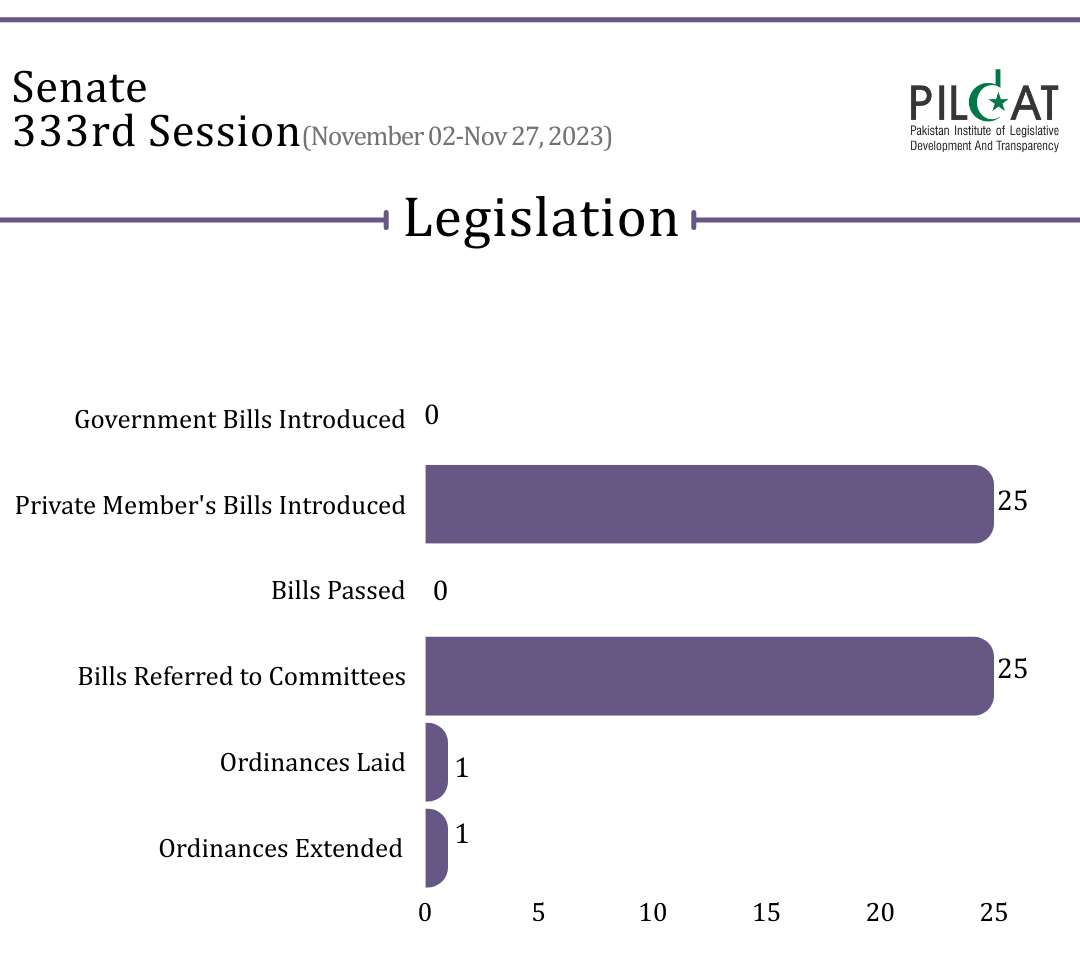
During the 333rd session, no bills were passed. However, a total of 25 private members’ bills were introduced. All introduced bills were referred to relevant standing committees.
The Senate extended the National Accountability (Amendment) Ordinance, 2023, by an additional 120 days, following a proposal by Caretaker Law Minister, Mr. Ahmad Irfan Aslam. During the session, Senate Chairman, Senator Muhammad Sadiq Sanjrani, who previously promulgated the ordinance as Acting President in July, adeptly navigated criticisms before the resolution for the extension was adopted. Initially enacted while President Dr. Arif Alvi was abroad, the ordinance was put into effect on the advice of former Prime Minister Mr. Muhammad Shehbaz Sharif. Among its amendments, the ordinance prolonged the period of physical remand for arrested individuals from 14 to 30 days and granted the NAB chairman the authority to issue arrest warrants for non-cooperation during investigations. Furthermore, it empowered the NAB to make arrests at the inquiry stage. The PTI’s Parliamentary Leader in the Senate, Senator Syed Ali Zafar, raised the first objection to the extension, questioning its legality in light of the Supreme Court’s ruling that deemed the amendments to the NAB law unconstitutional. He criticized the swift passage of the law, suggesting it targeted specific individuals and might reopen cases such as the Panama case involving former Prime Minister Mr. Nawaz Sharif.[1]
The Pakistan Future Council Bill 2023, introduced by Senator Sania Nishtar from the PTI, was rejected by the majority vote. Senator Sania Nishter presented the Future Council Bill, 2023 emphasizing the need for a regulatory body to oversee government entities, similar to those found in developed nations. She asserted that establishing such a council in Pakistan was imperative. The government side did not oppose the bill, prompting Senate Chairman Senator Sanjrani to permit the PTI Senator to present it. However, upon its presentation, the bill faced opposition from several senators. Senator Mushahid Hussain Sayed, Senator Abdul Ghafoor Haideri and Senator Sherry Rehman argued against the creation of the council for oversight. They contended that with existing parliamentary committees such as the standing committees of the Senate and National Assembly, as well as other special committees, establishing another regulatory body was unnecessary and would undermine parliamentary oversight.[2]
It must be noted that PILDAT has classified that a policy issue is such that involves any recommendation on devising a policy. Any discussion on an issue that does not go beyond mere criticism or highlighting a concern does not fall into policy issue and is treated as discussion or time spent on non-policy issues.
Time Consumed on Discussion of Policy Issues during 333rd Session
The effectiveness of the session’s time utilization can be assessed by examining the duration dedicated to discussing significant matters of democratic governance. During 333rd session of the Senate, total time consumed for discussion on policy issues spanned over 6 hours and 4 minutes. The maximum time consumed in discussing policy issues was on a motion “Decision of Federal Government to expel the Afghan Refugees from Pakistan” for 1 hour and 10 minutes.
The caretaker government decided to evict 1.1 million foreigners living illegally in Pakistan because of their involvement in funding and facilitating terrorists and other illegal activities. The Senate discussed this issue. The Caretaker Interior Minister Sarfaraz Bugti denied that any crackdown specific to Afghan immigrants was launched in the country, insisting that the crackdown was directed against all the illegal “aliens.” While addressing the Senate session, he said that “No crackdown is launched against the Afghan refugees, specifically—instead—this crackdown is aimed at all the illegal aliens residing in Pakistan. ” Leader of the Opposition, Senator Dr. Shahzad Waseem said that Pakistan shared strong and numerous social, linguistic, religious, tribal and regional ties with Afghanistan. The need of the hour was to introduce a holistic policy in which the consensus of all stakeholders, ranging from security and foreign policy experts, political and relevant military stakeholders, must be developed to resolve this sensitive issue.[3]
Leader of the House, Senator Muhammad Ishaq Dar, also briefed the house that Pakistan had suffered a lot in the past because of terrorism and experienced instability from Afghanistan. Addressing the Senate, Dar, without explicitly naming any entity or individual, accused those responsible for the policy shift of releasing “hardened criminals,” presumably referring to the Tehreek-e-Taliban Pakistan (TTP) in a bid for peace. After the tragic incident of December 16, 2014, the attack on Army Public Peshawar School shattered the whole nation. After major consultations with all political parties and representatives National Action Plan was introduced that eliminated the wave of terrorism from the country.[4]
The Senate passed a resolution during its sixth sitting against the Supreme Court’s decision that declared unconstitutional the military trials of civilians for their alleged role in attacks on army installations on May 9, 2023. Senator Dilawar Khan presented the resolution, which gained majority approval despite opposition from the PPP Senator Raza Rabbani and the Jamaat-e-Islami Senator Mushtaq Ahmed. The resolution stated that “prima facie an attempt has been made to rewrite the law by impinging upon the legislative authority of parliament.”[5]
It is crucial to highlight that PILDAT considers a policy issue as something involving recommendations for creating a policy. So, any talk that’s just criticism or highlighting concerns without suggesting policy changes isn’t seen as a policy issue. Instead, it’s seen as a discussion or time spent on non-policy matters. This underlines the significance of having meaningful discussions that contribute to shaping policies within the legislative context.
Table 1: Time Consumed on Discussion of Policy Issues

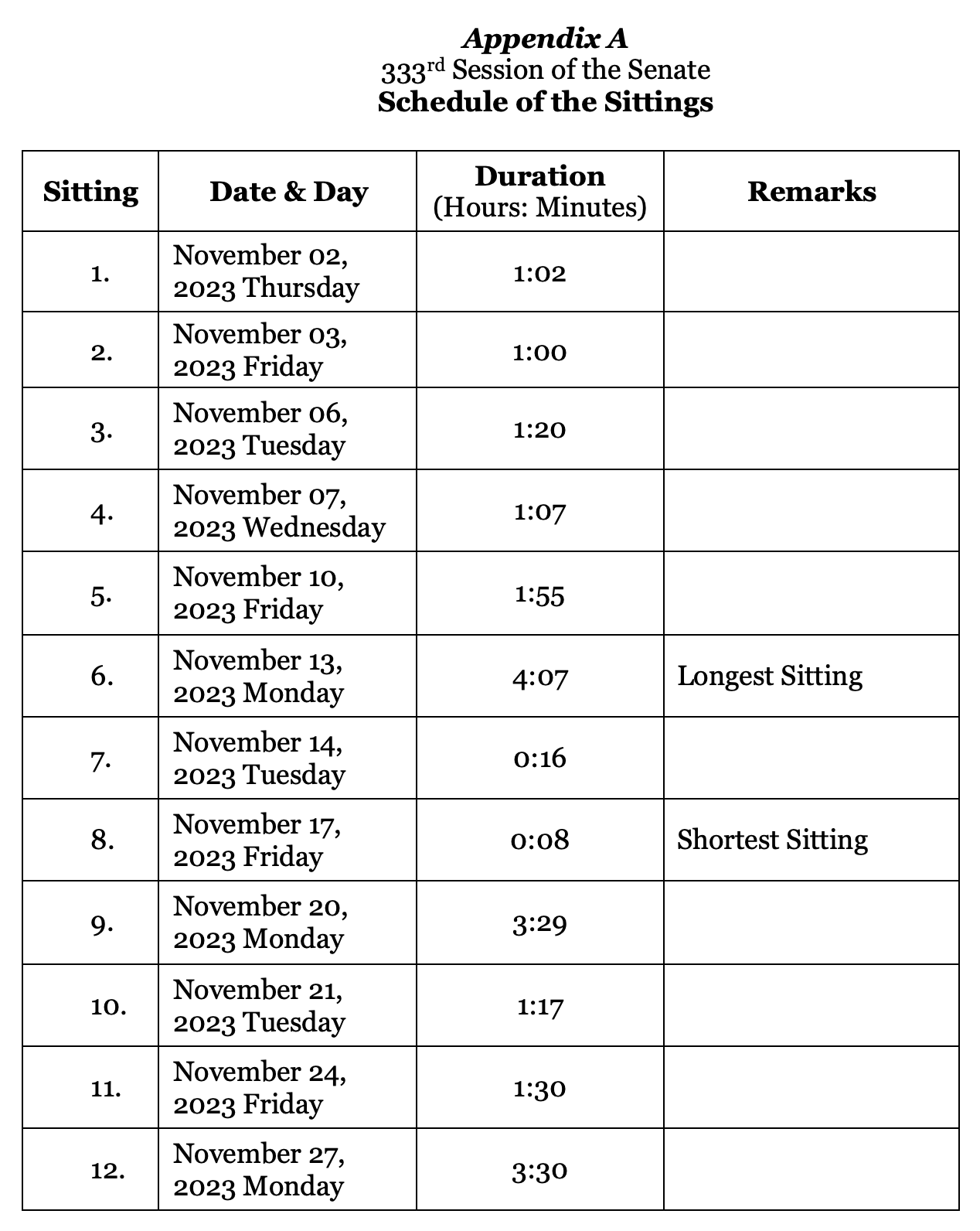
References
-
Iftikhar A. Khan, “Senate approves resolution for NAB ordinance extension,” Dawn online, November 3, 2023, accessed February 16, 2024. https://www.dawn.com/news/1786001. ↑
-
15 bills referred to Senate bodies, five deferred, one rejected,” Business Recorder online, November 7, 2023, accessed February 19, 2024. https://www.brecorder.com/news/40272029/15-bills-referred-to-senate-bodies-five-deferred-one-rejected. ↑
-
Crackdown underway against illegal immigrants, not Afghan nationals: Bugti, Associated Press of Pakistan online, November 13, 2023, accessed February 15, 2024. https://www.app.com.pk/national/crackdown-underway-against-illegal-immigrants-not-afghan-nationals-bugti/. ↑
-
Dar blames ‘shift’ in Pakistan’s Afghan policy after US exodus for surge in terror attacks. The Express Tribune online, November 13, 2023, accessed February 15, 2024. https://tribune.com.pk/story/2446204/dar-blames-shift-in-pakistans-afghan-policy-after-us-exodus-for-surge-in-terror-attacks. ↑
-
Senate deems SC’s military trial ruling flawed. The Express Tribune online, November 14, 2024, accessed February 15, 2024. https://tribune.com.pk/story/2446318/senate-deems-scs-military-trial-ruling-flawed. ↑






